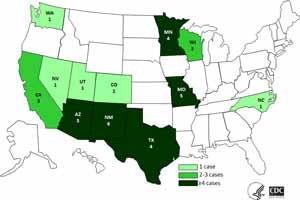The Kroger Co. announced yesterday that its family of grocery stores will no longer sell unrefrigerated caramel apples that have been pierced with dipping sticks because of a new study that found they support the growth of Listeria. The study, conducted by the Food Research Institute at the University of Wisconsin Madison, was prompted by the 2014 Listeria outbreak, which sickened 35 people, killing seven of them.
 “After reviewing the study, we have decided to voluntarily withdraw unrefrigerated caramel apples from our stores,” said Dr. Payton Pruett, Kroger’s vice president of food safety. “While we believe the potential health risk is minimal, we are acting out of an abundance of caution on behalf of our customers.”
“After reviewing the study, we have decided to voluntarily withdraw unrefrigerated caramel apples from our stores,” said Dr. Payton Pruett, Kroger’s vice president of food safety. “While we believe the potential health risk is minimal, we are acting out of an abundance of caution on behalf of our customers.”
Kroger operates 2,623 supermarkets in 34 states and the District of Columbia under two dozen local banner names including Kroger, City Market, Dillons, Food 4 Less, Fred Meyer, Fry’s, Harris Teeter, Jay C, King Soopers, QFC, Ralphs and Smith’s. The company also operates 781 convenience stores and 37 food processing plants. Caramel apples have been removed from all locations and discarded.
Pruett said the company is open to carrying caramel apples again in the future and will work with suppliers to reduce the risk of bacterial growth. But for now, caramel apple lovers will have to find other options.
The 2014 outbreak was the first time caramel apples had been associated with Listeria. That outbreak was linked to apples produced by Bidart Brothers which issued a recall for Gala and Granny Smith apples.
Various companies added caramel to the apples. They were sold under sold under the Kroger and Happy Apples brand names at Walmart, Sam’s Club, Kroger, Safeway, United Supermarkets, Amigos, Albertsons Market, Market Street and United Express stores.
They were also sold under the Merb’s Candies brand in the St. Louis area and under the Karm’l Dapple brand name at grocery, discount, and club stores in Arizona, California, Nevada, Texas, and Utah.
In New Mexico, they were sold at Smith’s Food and Drug, And in Minnesota, North Dakota, Iowa, Wisconsin, and Michigan, the caramel apples that were potentially contaminated with Listeria but not recalled were sold under the brands: Aamodt’s, Abdallah, Angeli Foods, Candy Jar, Carnival, Celebration, Circle K, Finnottes, Grandma Bev’s, Jerry’s Foods, Karamel King, Kowalski’s Markets, Kitchen Cravings, Lunds & Byerly’s, Supermom’s, and Wescott.
 Thirty five illnesses from 12 states were reported. Case patients, who ranged in age from newborn to 92 with a median age of 62, reported onset of illness from October 17, 2014, to January 6, 2015.
Thirty five illnesses from 12 states were reported. Case patients, who ranged in age from newborn to 92 with a median age of 62, reported onset of illness from October 17, 2014, to January 6, 2015.
All but three of those sickened reported eating commercially prepared, pre-packaged caramel apples before they became ill. The 12 states that reported cases were: Arizona, California, Colorado, Minnesota, Missouri, New Mexico, North Carolina, Nevada, Texas, Utah, Washington, and Wisconsin.
Listeria infections cause symptoms including fever, muscle aches, headache, diarrhea or other gastrointestinal symptoms. Among pregnant women, Listeria infections can trigger miscarriages, stillbirths, premature delivery and Listeria meningitis in newborns.
Eleven of the cases in the 2014 outbreak were associated with pregnancy including three premature births and one fetal loss. Three pediatric cases of Listeria meningitis were also reported. A lawsuit was filed on behalf of a woman and her newborn baby who was born with a Listeria infection.




